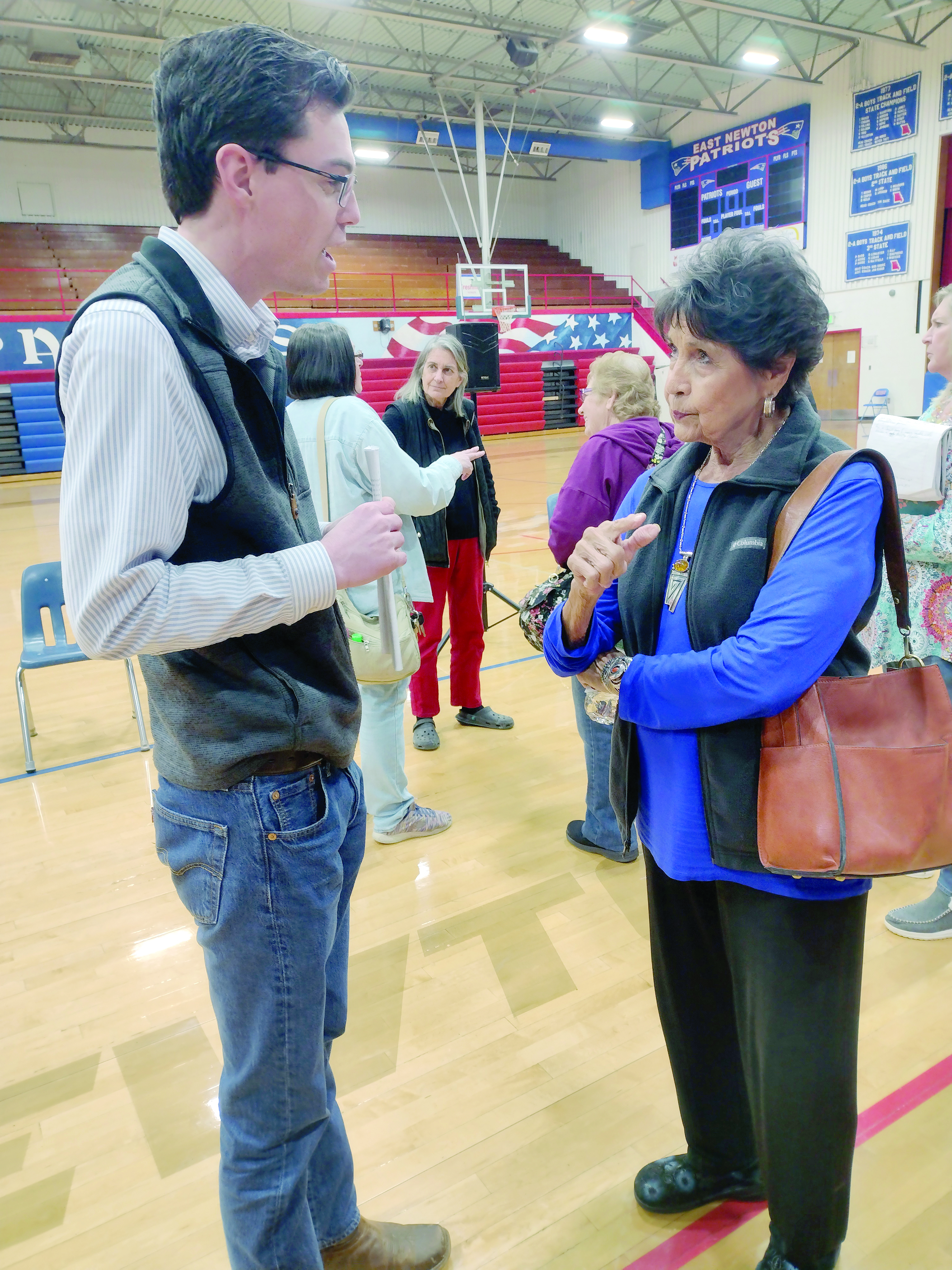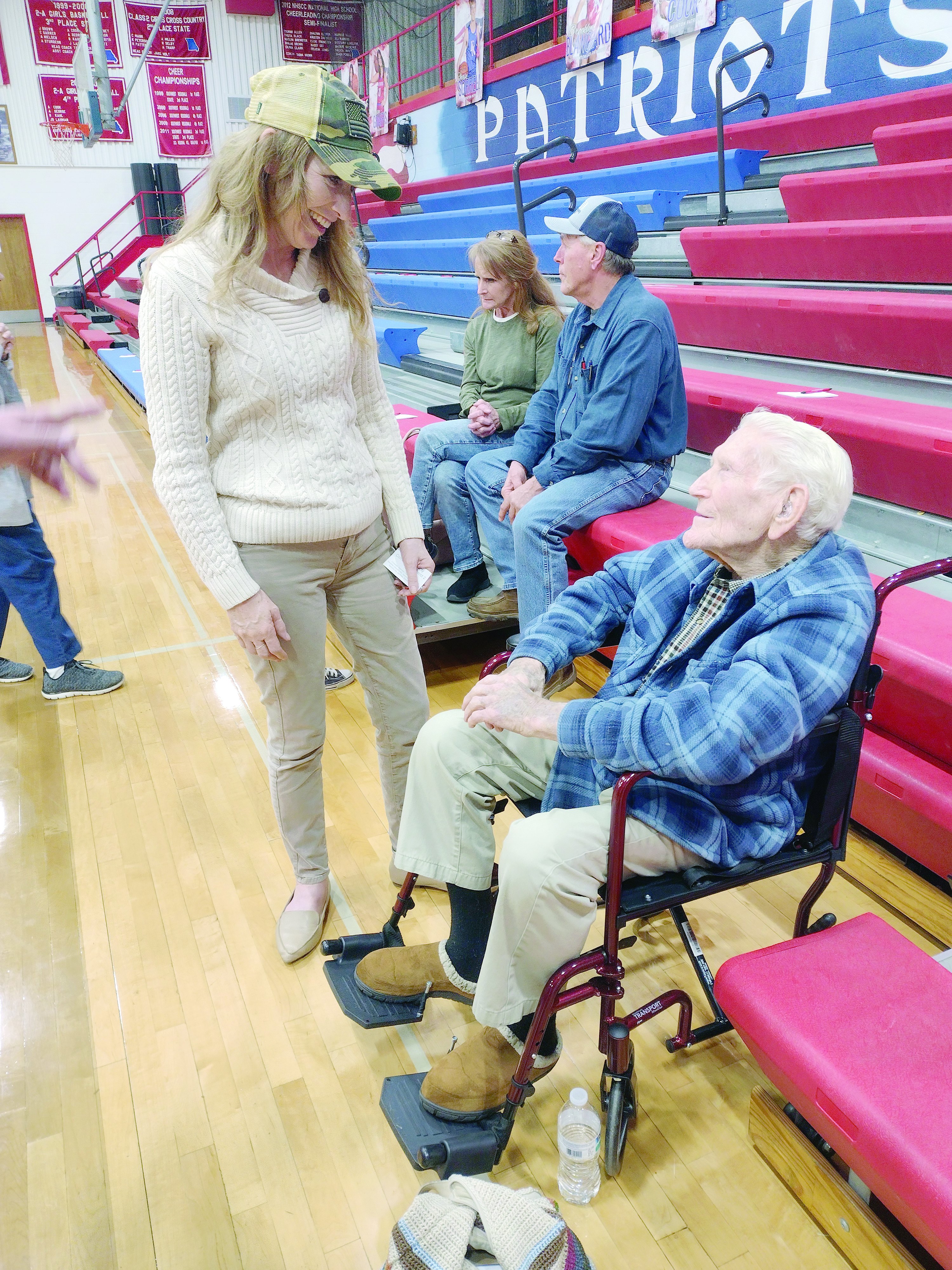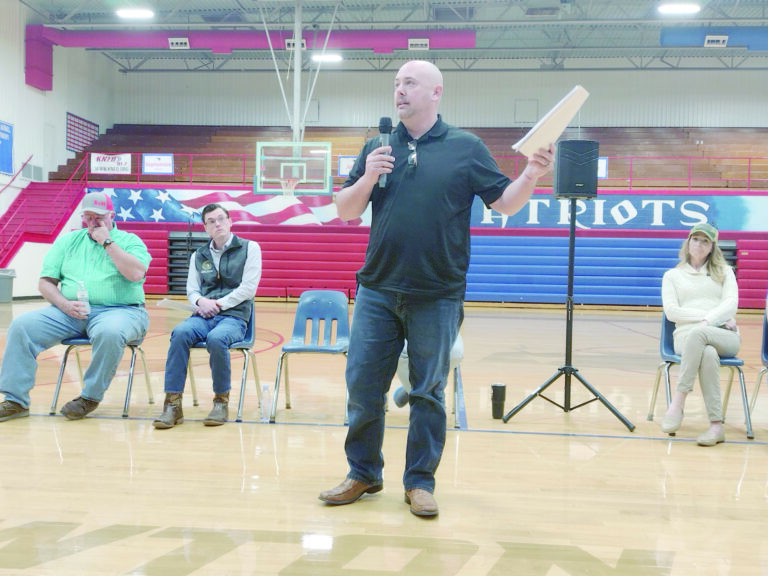

Legislators, industry insider address large audience at East Newton High School
By Sheila Harris sheilaharrisads@gmail.com
State Rep. Dirk Deaton, R-Noel, and State Sen. Jill Carter, R-Granby, spoke to a group of some 100 people who attended an event to raise money for legal fees for SLUDGE, LLC, at East Newton High School, Feb. 24.
The legislators have each introduced bills that pertain to the storage and land-application of industrial sludge, a topic that prompted citizens’ group SLUDGE (Stop Land Use Damaging our Ground and Environment) to file a lawsuit against the Missouri Department of Natural Resources (DNR) on Nov. 14, 2023.
SLUDGE alleges that by allowing the construction and operation of Denali Water Solutions’ 15-million-gallon storage basins in Newton and McDonald Counties without Solid Waste Management permits, the DNR is failing to uphold the Missouri Solid Waste Management Law.
According to SLUDGE’s petition, Denali’s description of the materials they planned to store and land-apply (in a management plan presented to the DNR) matched the DNR’s own definition of solid waste.
If SLUDGE prevails in its lawsuit, state solid waste permits will be required for companies who land-apply slaughterhouse residuals – a lengthy and time-consuming process, said SLUDGE-member Vallerie Steele.
William Wymore, of Owensville – who calls himself an “industry insider” – was a guest speaker at the SLUDGE fundraising event. Wymore has spent three years traveling the country to present poultry and pet food processors with alternatives to their current wastewater treatment processes, which, he said, are damaging to the environment and a source of lost revenue for producers.
Wymore, an independent contractor, offers a viable and healthier alternative: new technology which uses rare earth elements.
“I’m not here to promote my business, just to share information about the food-processing industry and its treatment of wastewater,” Wymore said. “The goal of wastewater treatment [in meat processing] is to meet the regulatory requirements to release it into the environment. In order to do that, the contaminants have to be removed.”
The meat-processing sludge being land-applied to local fields consists of those contaminants that have been removed, Wymore said.
“Traditional wastewater treatments use a Dissolved Air Flotation (DAF) or Suspended Air Flotation (SAF) process that includes a chemical coagulant or surfactant that causes particles to clump together and rise to the surface, while the ‘cleaned’ liquid remains below,” Wymore said.
The solids, or “sludge,” he said, is then skimmed off and transported for storage or direct land-application, and the liquids are released into the environment.
“The sludge will contain the residue of any chemicals and surfactants used during poultry processing and wastewater treatment,” Wymore said.
Although Wymore did not refer to any businesses by name, he said it upsets him to hear of companies promoting meat-processing sludge to farmers as free “nutrient-rich” fertilizer.
“The sludge actually is nutrient rich,” he said. “Really rich.”
Too rich in nutrients and too rich in chemicals, Wymore believes.
Wymore explained that nutrient overload is a real danger.
“Animals can get sick and die from nitrate toxicity, as can fish in waterways where nitrate runoff occurs,” he said.
Algae blooms in ponds, lakes, streams and rivers are an indication that waterways contain an abundance of nutrients, Wymore said. In excess, they can lead to a process called eutrophication, in which the water is deprived of oxygen.
“Excess nitrates in well water can cause problems for humans, too, especially young children and vulnerable adults,” Wymore said. “The meat-processing wastes being land-applied fall into a category known as an ‘undigested biosolid,’ which basically means that it’s raw.”
Wymore also brought up the specter of bird flu among chickens and increasing chronic wasting disease in the deer population: possibly the result of eating undigested biosolids from fields, he said.
Wymore questions why waste-hauling companies would give their waste away for free, if it’s the valuable commodity they claim that it is.
“There’s kind of an incestuous business relationship going on,” Wymore said. “Lobbyists for big agricultural companies, waste-haulers and chemical companies are working together, and are also affecting our legislation. They want us to believe they’re helping our communities by donating this sludge. In reality, they’re all making lots of money by assuring that the current status quo is maintained, and they are damaging our environment while they’re at it.”
Wymore said new technology using rare earth elements provides a better separation of liquids and solids in the wastewater treatment process, while maintaining the molecular integrity of the solids, without the damage caused by chemicals and surfactants. Instead of being land-applied as semi-liquid sludge, the solids can be dehydrated and used beneficially in other ways, with lower (to no) transportation costs and greater revenue for producers.
Too good to be true? Maybe. But, Wymore had the rapt attention of those present at the fundraiser.
At the conclusion of Wymore’s presentation, Deaton spoke.
“Things are a lot better today [regarding the land-application of sludge] than they were before July 1 of 2023,” he said, in reference to the date when sludge land-application could no longer be performed with a fertilizer permit.
Deaton’s sponsored House Bill 1956, in combination with State Rep. Ed Lewis’s, R-Randolph County, HB 2134, passed the House with a vote of 151-2, two weeks ago, and is now awaiting Senate approval. The legislation calls for monthly testing of waste for heavy metals and pathogens in storage basins where animal byproducts are stored; mandates for the installation of groundwater monitoring wells, where needed; the introduction of a nutrient management standard overseen by the DNR; and restrictions from [fertilizer] permit exemptions, unless a company is engaged in the sale of commercial fertilizer.
Carter encouraged those in attendance at the fundraising event to continue making their voices heard.
“You have a voice; keep doing what you’re doing,” she said.
Carter has introduced Senate Bill 908, which calls for rules for the regular testing of stored animal residuals to determine if they’re a viable soil amendment for land-application. SB 908 is awaiting full senate approval.
Steele, who lives adjacent to the Denali storage lagoon in Newton County, believes both of the proposed bills in the Senate and House should have more stringent specifications.
“We need to make sure any testing of sludge is performed by a third-party lab,” Steele said.
It’s also a concern, she said, with the pending land-application and storage permits presented to the DNR for Synago and HydroAg, gearing up to land-apply slaughterhouse waste to over 8,400 acres in Barry County.
“No mention of third-party testing is mentioned on the proposed permits,” Steele said.
Barry County state legislators – State Rep. Scott Cupps, R-Shell Knob, and State Sen. Mike Moon, R-Ash Grove – were not present at the fundraiser.
A public-comment period is now open on the DNR’s website for Synagro’s proposed permits in Barry and McDonald Counties. Details can be found at https://dnr.mo.gov/calendar/event/251416.
Information about submitting comments pertaining to HydroAg’s proposed permits in Barry County can be found at https://dnr.mo.gov/calendar/event/251426.
Comments will be accepted through March 18. If the DNR receives enough feedback, a public hearing may be scheduled.
In addition to submitting comments to the DNR regarding permit applications, Barry County residents are invited to support SLUDGE’s lawsuit. If a judge rules in favor of the citizens’ group, the outcome of the decision will benefit residents of Barry County and the entirety of the state, said Vallerie Steele.
Donations to the SLUDGE fund can be made through PayPal@KorrieBateman; to any Security Bank branch, with donations made payable to Taryn Tyler, with “sludge” on the subject line; or directly to any sludge committee member: Vallerie Steele, Korrie Bateman or Adam Periman. Information regarding ways to donate can also be found on the group’s website at www.stopsludgespreading.com.
The SLUDGE case is currently awaiting a May hearing on Contempt of Court charges filed by the plaintiff against Denali Water Solutions and landowners Keith Gideon and Jerry Evans, for refusing to allow lab samples to be taken from the Denali storage basins.






